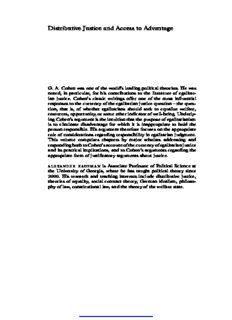
Distributive Justice and Access to Advantage: G. A. Cohen's Egalitarianism PDF
Preview Distributive Justice and Access to Advantage: G. A. Cohen's Egalitarianism
Distributive Justice and Access to Advantage G.A.Cohenwasoneoftheworld’sleadingpoliticaltheorists.Hewas noted, in particular, for his contributions to the literature of egalitar- ian justice. Cohen’s classic writings offer one of the most influential responsestothecurrencyoftheegalitarianjusticequestion–theques- tion, that is, of whether egalitarians should seek to equalize welfare, resources,opportunity,orsomeotherindicatorofwell-being.Underly- ingCohen’sargumentistheintuitionthatthepurposeofegalitarianism is to eliminate disadvantage for which it is inappropriate to hold the personresponsible.Hisargumentthereforefocusesontheappropriate roleofconsiderationsregardingresponsibilityinegalitarianjudgment. This volume comprises chapters by major scholars addressing and respondingbothtoCohen’saccountofthecurrencyofegalitarianjustice anditspracticalimplications,andtoCohen’sargumentsregardingthe appropriateformofjustificatoryargumentsaboutjustice. is Associate Professor of Political Science at the University of Georgia, where he has taught political theory since 2000. His research and teaching interests include distributive justice, theoriesofequality,socialcontracttheory,Germanidealism,philoso- phyoflaw,constitutionallaw,andthetheoryofthewelfarestate. Distributive Justice and Access to Advantage G. A. Cohen’s Egalitarianism Editedby Alexander Kaufman UniversityofGeorgia UniversityPrintingHouse,CambridgeCB28BS,UnitedKingdom CambridgeUniversityPressispartoftheUniversityofCambridge. ItfurtherstheUniversity’smissionbydisseminatingknowledgeinthepursuitof education,learningandresearchatthehighestinternationallevelsofexcellence. www.cambridge.org Informationonthistitle:www.cambridge.org/9781107079014 ©CambridgeUniversityPress2015 Thispublicationisincopyright.Subjecttostatutoryexception andtotheprovisionsofrelevantcollectivelicensingagreements, noreproductionofanypartmaytakeplacewithoutthewritten permissionofCambridgeUniversityPress. Firstpublished2015 PrintedintheUnitedKingdombyClays,StIvesplc AcataloguerecordforthispublicationisavailablefromtheBritishLibrary LibraryofCongressCataloguinginPublicationdata Distributivejusticeandaccesstoadvantage:G.A.Cohen’segalitarianism/edited byAlexanderKaufman. pages cm ISBN978-1-107-07901-4(hardback) 1.Distributivejustice. 2.Equality. 3.Cohen,G.A.(GeraldAllan),1941–2009. I.Kaufman,Alexander,1958–editorofcompilation. HB523.D5698 2014 320.01′1–dc23 2014032241 ISBN978-1-107-07901-4Hardback CambridgeUniversityPresshasnoresponsibilityforthepersistenceoraccuracyof URLsforexternalorthird-partyinternetwebsitesreferredtointhispublication, anddoesnotguaranteethatanycontentonsuchwebsitesis,orwillremain, accurateorappropriate. Contents Listofcontributors pagevii Acknowledgments viii Introduction 1 PartI Justiceandjustification 1 Thefundamentaldisagreementbetweenluck egalitariansandrelationalegalitarians 21 2 Justice,interpersonalmorality,andluckegalitarianism 40 3 Theegalitarianethosasasocialmechanism 50 . 4 Justiceandthecrookedwoodofhumannature 79 5 Facts,principles,andtheThirdMan 95 PartII Justiceandequality 6 Equalityandfreedom:Cohen’scritiqueofSen 117 7 Theincoherenceofluckegalitarianism 131 8 Whatisthepointofegalitariansocialrelationships? 151 v vi Contents 9 Basicequalityandthecurrencyofegalitarianjustice 180 PartIII Equalityandsociety 10 Whynotcapitalism? 207 . 11 Thelabortheoryofjustice 235 12 Rescuingjusticeandequalityfromlibertarianism 249 Index 271 Contributors , DepartmentofPhilosophy,Universityof Michigan. . , DepartmentofPhilosophy,Universityof California,SanDiego. . , DepartmentofPoliticalScience,Universityof Toronto. , DepartmentofPhilosophy,UniversityofTennessee. , DepartmentofPoliticalScience,University ofGeorgia. , DepartmentofGovernment,LondonSchool ofEconomicsandPoliticalScience. , NuffieldCollege,UniversityofOxford. , ICREA-UniversitatPompeuFabra. , DepartmentofPoliticsandInternational Relations,UniversityofReading. , DepartmentofPhilosophy,Universityof Missouri-Columbia. , DepartmentofPhilosophy,LogicandScientific Method,LondonSchoolofEconomicsandPoliticalScience. , DepartmentofPhilosophy,LogicandScientificMethod, LondonSchoolofEconomics. vii Acknowledgments Iamgratefulforpermissiontoincludethefollowinginthiscollection: Chapter1 Elizabeth Anderson, “The Fundamental Disagreement between Luck EgalitariansandRelationalEgalitarians,”CanadianJournalofPhilosophy, Vol. 40, Supplement 1 (2010) Special Issue: Supplementary Vol. 36: JusticeandEquality:1–23.©Routledge,Taylor&FrancisGroup. Chapter5 LeaYpi,“Facts,Principles,andtheThirdMan,”SocialistStudies/Etudes Socialistes(www.socialiststudies.com)8(1)(2012)[specialissueonG.A. Cohen]:196–215.©SocietyforSocialistStudies(SSS). Chapter6 Alexander Kaufman, “Capabilities and Freedom,” Journal of Political Philosophy14(3)(2006):289–300.©JohnWiley&Sons. Chapter12 Serena Olsaretti, “Rescuing Justice and Equality from Libertarianism,” Economics and Philosophy 29 (2013): 43–63. © Cambridge University Press. viii Introduction Alexander Kaufman What is the proper measure of a person’s condition for the purposes of determiningwhatweoweeachother,asamatterofjustice?Shouldegal- itarians seek to equalize welfare, resources, opportunity, or some other indicatorofwell-being?SinceAmartyaSenproblematizedthecurrencyof egalitarian justice question in his “Equality of What?” Tanner Lectures of the late 1970s, the question has been the subject of a continuous stream of articles, monographs, and extended studies.1 Research inter- est in thearea continues toaccumulate momentum,withnew books by G. A. Cohen, Ronald Dworkin, Martha Nussbaum, Samuel Scheffler, andAmartyaSenpublishedinthelastfiveyears.2 Cohen’sclassicarticles,“OntheCurrencyofEgalitarianJustice”and “Equality of What? On Welfare, Goods, and Capabilities,” offer one of the most influential responses to the currency-of-justice question. In developinghisresponse,Cohenaimstopresentaconceptionofegalitar- ianjusticethatiscapableofaccommodatingtwofundamentalegalitarian concerns. The first concern reflects the intuition that the aim of egali- tarian justice is to extinguish the influence of bad brute luck on the 1 See,forexample,R.Arneson,“EqualOpportunityforWelfare,”PhilosophicalStudies,56 (1989):77–93;G.A.Cohen,“OntheCurrencyofEgalitarianJustice,”Ethics,99(1989): 906–944; R. Dworkin, “What Is Equality? Part 2: Equality of Resources,” Philosophy and Public Affairs, 10 (1981): 283–345; M. C. Nussbaum, “Human Functioning and SocialJustice:InDefenseofAristotelianEssentialism,”PoliticalTheory,20(1992):202– 246;D.Parfit,“Ongivingprioritytotheworse-off,”unpublishedmanuscript,Oxford, 1991;J.Roemer,“EqualityofTalent,”EconomicsandPhilosophy,1/2(1985):151–188; T.Scanlon,“PreferenceandUrgency,”JournalofPhilosophy,72(1975):665–669;A.Sen, “Well-Being,AgencyandFreedom:TheDeweyLectures1984,”JournalofPhilosophy, 82(1985):169–220. 2 G.A.Cohen,OntheCurrencyofEgalitarianJustice,andOtherEssaysinPoliticalPhilos- ophy(Princeton,NJ:PrincetonUniversityPress,2011);R.Dworkin,JusticeforHedge- hogs(Cambridge,MA:HarvardUniversityPress,2010);M.Nussbaum,CreatingCapa- bilities (Cambridge, MA: Harvard University Press, 2011); S. Scheffler, Equality and Tradition: Questions of Value in Moral and Political Theory (Oxford: Oxford University Press, 2010); A. Sen, The Idea of Justice (Cambridge, MA: Harvard University Press, 2009). 1 2 AlexanderKaufman distribution of social goods. The second concern reflects the intuition that egalitarian justice should only correct for inequalities of condition forwhichitisinappropriatetoholdthepersonresponsible. In response to the first concern, Cohen argues that it is the presence orabsenceofchoicethatdetermineswhetheradisadvantageisproperly viewed as merely the product of bad brute luck, for which it is appro- priate to compensate the person, or as the product of option luck, for which it is not. An acceptable egalitarian theory should therefore aim to discriminate between cases of disadvantage that are the product of free and genuine choice and those that are not. Thus, for example, a personwhosedisadvantagederivesfromexpensivetastesshouldnotfor- feit his claim for compensation merely upon a showing that his tastes areexpensive;itmustbeshown,inaddition,thatthepersoncouldhave avoided imposing costs on the community and chose to impose those costs–thatis,itmustbeshownthatthosetastesarewantonlyexpensive. It is the presence of choice, Cohen argues, that is morally significant, not the expensiveness of the taste. Cohen qualifies this view, however, byarguing thategalitarians shouldcompensate persons fordisadvantage that is the result of free choice if the person identifies with the choice, butnotwiththeresultingdisadvantage.Forexample,Cohenarguesthat apersonwithexpensivetastesinmusic(e.g.sheprefersBergtobe-bop) may assert a tenable claim to compensation for resulting disadvantage because, even if she can reasonably be held responsible for forming the taste for Berg, she can reasonably deny responsibility for the fact that greaterexpenseisrequiredinordertosatisfythattaste. In response to the second concern, Cohen argues that egalitarians should hold a person responsible for disadvantage generated by her free choices only if the resulting disadvantage is so intrinsically connected to the person’s commitments that the person would not choose to be without it. Even if such choices are, in fact, affected by the contingent influence of context or genetic endowment, the intrinsic connection of the preferences grounding the choice to the person’s constitutive com- mitments can be understood to transform such choices from merely contingenttogenuinelyautonomous.Thus,forexample,theegalitarian should not compensate a religious believer for religiously induced feel- ings of guilt, since the person would not choose not to be without the guiltifshecould. Cohen’s views were developed in the context of an intense engage- ment with Ronald Dworkin’s contribution to the egalitarian literature, and Cohen proposes alternative accounts of both the measure of a per- son’sconditionthategalitariansshouldemployinformingjudgmentsof justice and the criterion that egalitarians should employ in assigning
